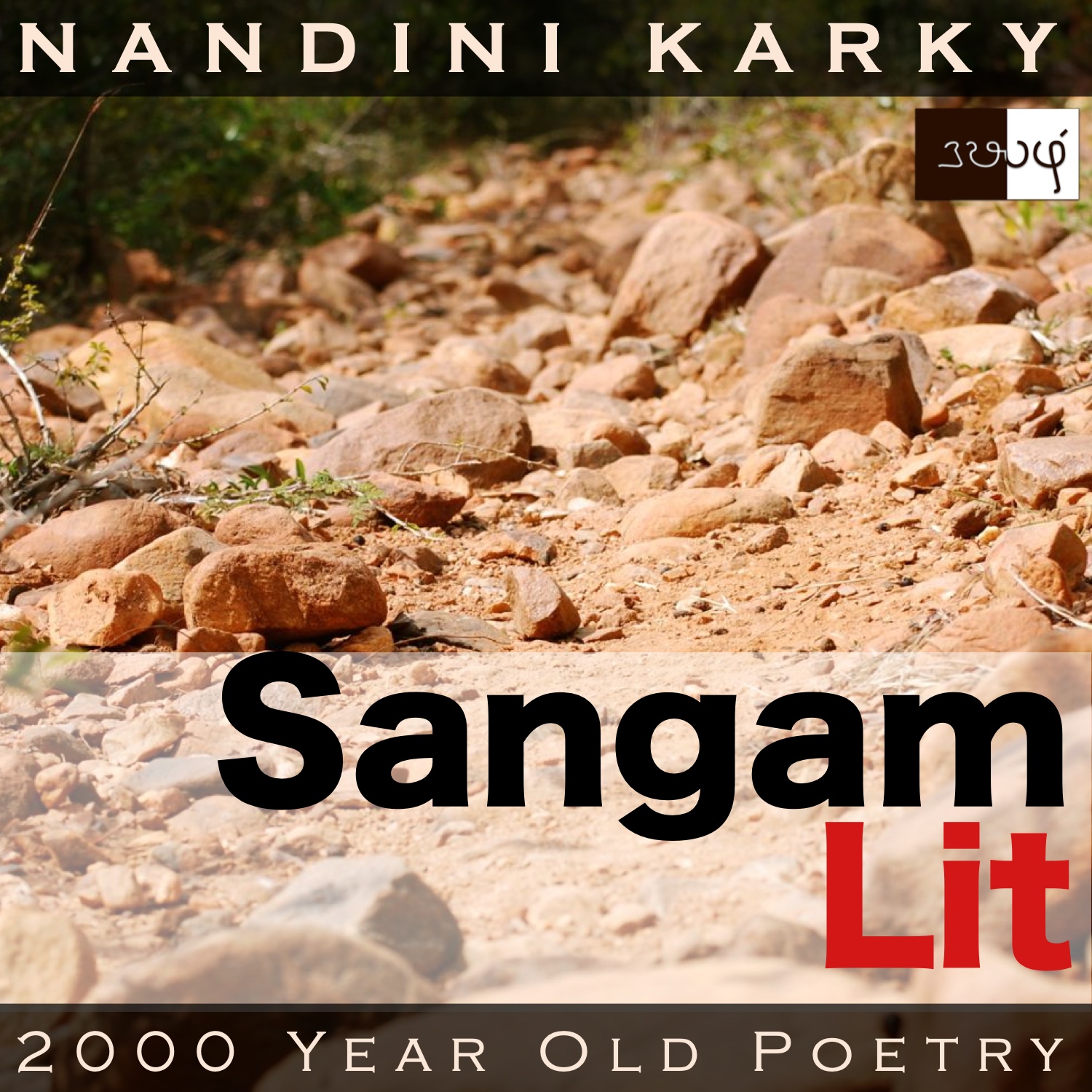Podcast: Play in new window | Download
Subscribe: Apple Podcasts | Spotify | Amazon Music | Android | iHeartRadio | TuneIn | RSS | More

In this episode, we listen to words of heartfelt gratitude, as depicted in Sangam Literary work, Kurunthogai 400, penned by Peyanaar. Set in the forests of ‘Mullai’, the verse speaks in the voice of the man to his charioteer, on returning home after his long journey away from the lady.
‘சேயாறு செல்வாம் ஆயின், இடர் இன்று,
களைகலம் காமம், பெருந்தோட்கு” என்று,
நன்று புரிந்து எண்ணிய மனத்தை ஆகி,
முரம்பு கண் உடைய ஏகி, கரம்பைப்
புது வழிப் படுத்த மதியுடை வலவோய்!
இன்று தந்தனை தேரோ-
நோய் உழந்து உறைவியை நல்கலானே?
‘Not a mere ride, but the life of my love!’ declares a voice with emotion in this verse. The opening words ‘சேயாறு செல்வாம் ஆயின்’ meaning ‘if we were to take the long road’ puts forth a hypothetical case. In ‘எண்ணிய மனத்தை ஆகி’ meaning ‘with a thoughtful mind’, we see appreciation rendered for the consideration of another. A dynamic portrait of bold actions appear in ‘முரம்பு கண் உடைய ஏகி’ meaning ‘riding so as to break the stony land’. The phrase ‘புது வழிப் படுத்த மதியுடை வலவோய்’ meaning ‘the wise charioteer, who has paved a new path’ glorifies a worker for his services. Ending with the words ‘உறைவியை நல்கலானே’ meaning ‘haven’t you rendered my beloved?’, the verse invites us to listen intently.
A pathbreaker seems to have a reason to smile here! The context reveals that the man and lady were leading a happy, married life when the man parted away to gather wealth. Before he leaves, he promises to be back by a particular season. Having completed his mission, the man returns home. On reaching his home, he turns to his charioteer and says, “Thinking in your mind, ‘If we were to travel on the regular, long route, we may not be able to avoid causing suffering as we may not be able to remove in time, the affliction of separation in the lady with huge shoulders’, and so, wanting for good things to happen, you have wielded the chariot on pebble-filled, high-raised land, and paved a new path in that harsh drylands, O intelligent charioteer! Did you just render unto me, a chariot ride… No, you have rendered unto to me my dearest, who was wallowing in the disease of pining!” With these words, the man celebrates his charioteer for the thoughtfulness and timeliness in bringing the man home to the lady.
Words of gratitude resound with joy, no matter who renders them! Let us follow the man’s words closely to understand what transpired. The man starts by elaborating what should have gone through in the charioteer’s mind as they started their journey from the drylands back to the man’s home. This experienced man on the wheels knows that if they were to take the usual path, that would be comfortable indeed, but it would be a rather long and winding trip and they would not reach in time. That was crucial just then because the lady’s very life seemed to hang in balance, as she waited for the man with that promised season fast approaching. So, the charioteer, thinking that he must make haste to end the lady’s suffering, rode his chariot up the unpaved, rocky and raised path. Here’s a two-thousand year-old illustration of taking a short cut, so familiar to us, in today’s racing modern world!
Returning, we find the man appreciating the charioteer for that choice he made then. It was a new path, the chariot rode on, no doubt, one filled with the risk of going where no one has gone before, but the charioteer had the expertise to follow through his decision. So, hastening on that path, the horses flew like the wind, not minding the discomfort of the rickety path, one in mind with their master, the charioteer, and brought the man home to the lady. On seeing the man, that wilting flower should have raised her head and shown signs of blooming back to health and vitality. And that’s why, the man ends his words by saying to the charioteer that it was not a mere ride through the drylands, his worker had rendered to him, but the very life of his languishing lady!
Indeed, the charioteer was in the man’s employ. He was just doing his job for a pay. But instead of dismissing the man’s services so, as is the case in countless modern teams, here we see an exceptional demonstration of appreciating the worth of a worker. Not with a simple ‘thanks’ and a vague ‘you did good’ but clearly talking about the actions, the choices of this person, and most importantly, the difference they have made with their services. Something for people in the corridors of power all over the world even today to learn from this grateful man from the past in this moment he praises his path-breaking charioteer!




Wonderful Narration